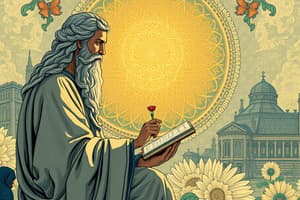Podcast
Questions and Answers
Which statement best describes the foundation of the social self theory?
Which statement best describes the foundation of the social self theory?
- The self is a fixed identity shaped solely by genetics.
- The self is an innate quality that remains constant.
- The self is continuously created and recreated through interactions. (correct)
- The self only develops in response to significant life events.
What is the main concept of the 'Looking-glass Self theory'?
What is the main concept of the 'Looking-glass Self theory'?
- Self-concept is an isolated experience not influenced by society.
- Self-concept arises from interactions and perceptions of others. (correct)
- Self-concept is developed through direct self-reflection.
- Self-concept is solely influenced by family upbringing.
Which stage involves children copying others without understanding their actions?
Which stage involves children copying others without understanding their actions?
- Preparatory Stage (correct)
- Imagination Stage
- Interpretation Stage
- Social Stage
In the stages of the Looking-glass Self, which stage focuses on imagining how we appear to others?
In the stages of the Looking-glass Self, which stage focuses on imagining how we appear to others?
What concept refers to individuals directly affecting our self-perception?
What concept refers to individuals directly affecting our self-perception?
Which of the following statements is true regarding the 'I' and 'Me' self in social self theory?
Which of the following statements is true regarding the 'I' and 'Me' self in social self theory?
The concept of 'Generalized Others' primarily reflects which of the following?
The concept of 'Generalized Others' primarily reflects which of the following?
Which sociologist introduced the concept of 'Looking-glass Self'?
Which sociologist introduced the concept of 'Looking-glass Self'?
Which philosopher is known for the statement 'I think, therefore I am'?
Which philosopher is known for the statement 'I think, therefore I am'?
What concept did David Hume propose regarding the self?
What concept did David Hume propose regarding the self?
Which philosopher developed the Tripartite Theory of the Soul?
Which philosopher developed the Tripartite Theory of the Soul?
According to Immanuel Kant, what does the Inner Self comprise?
According to Immanuel Kant, what does the Inner Self comprise?
Which figure is associated with the idea of the self being a product of brain activity?
Which figure is associated with the idea of the self being a product of brain activity?
What does Aristotle argue about the relationship between the body and the soul?
What does Aristotle argue about the relationship between the body and the soul?
Which philosopher coined the phrase 'ghost in the machine'?
Which philosopher coined the phrase 'ghost in the machine'?
What does the Tabula Rasa concept refer to in John Locke's philosophy?
What does the Tabula Rasa concept refer to in John Locke's philosophy?
What is Sigmund Freud’s concept of ego primarily concerned with?
What is Sigmund Freud’s concept of ego primarily concerned with?
Which statement best reflects Saint Augustine of Hippo's view on the self?
Which statement best reflects Saint Augustine of Hippo's view on the self?
Flashcards are hidden until you start studying
Study Notes
Philosophers on the Self
-
Socrates: Ancient Greek philosopher emphasizing introspection. His famous saying, "Know Thyself," highlights self-examination as the foundation of true wisdom.
-
David Hume: Scottish philosopher who argued that the self is merely an illusion. Introduced the Bundle Theory, positing that the self is a collection of perceptions, thoughts, and sensations.
-
Plato: Ancient Greek philosopher believed in the immortality of the self, separate from the body. His Tripartite Theory of the Soul comprises Reason, Spirit, and Appetite.
-
Immanuel Kant: German philosopher who distinguished between the Inner Self (emotions and rational intellect) and the Outer Self (physical sensations).
-
Aristotle: Ancient Greek philosopher and polymath viewed the body and soul as inseparable, asserting that the self is a unified being.
-
Saint Augustine of Hippo: Theologian and philosopher whose concept of self is deeply connected to God. He argued that self-fulfillment is achieved through divine grace.
-
René Descartes: French philosopher known for "I think, therefore I am." Proposed dualism, arguing for the separation of mind and body.
-
John Locke: English philosopher who introduced the concept of Tabula Rasa, claiming the self evolves through experiences and memories influenced by society from birth.
-
David Hume: Emphasized the role of society in shaping identity, thoughts, feelings, and actions.
Influential Sociologists
-
George Herbert Mead: American philosopher and sociologist who studied human interaction. Developed the Social Self theory, stating "Society is unity in diversity."
-
Charles Horton Cooley: American sociologist known for the Looking-glass Self theory, suggesting that the self is continuously created and recreated through social interactions.
Aspects of Social Self Theory
-
Self Development:
- The "I" represents spontaneous actions; the "Me" reflects adherence to societal rules and expectations.
-
Role-Taking: Involves understanding others through one's actions, promoting empathy and social cohesion.
-
Stages of the Looking-glass Self Theory:
- Imagination: Envisioning judgments from others about oneself.
- Interpretation: Considering how one appears to others and their potential reactions.
- Self-feeling: Developing self-concept based on social feedback.
Stages of Development
- Preparatory Stage (Imitation): Occurs from ages 0 to 2, where children imitate peers without understanding the meaning behind actions, words, or social cues.
Studying That Suits You
Use AI to generate personalized quizzes and flashcards to suit your learning preferences.




